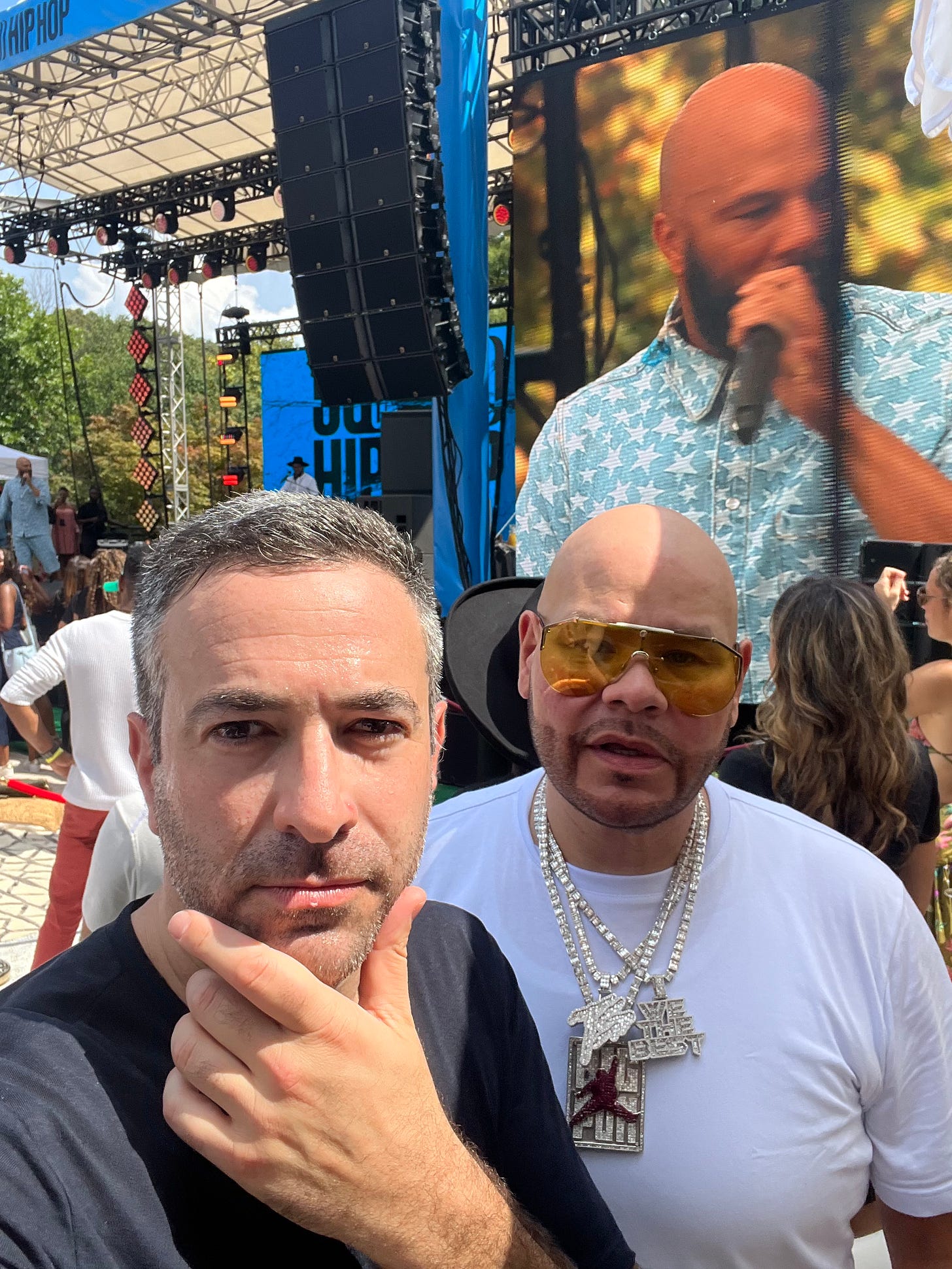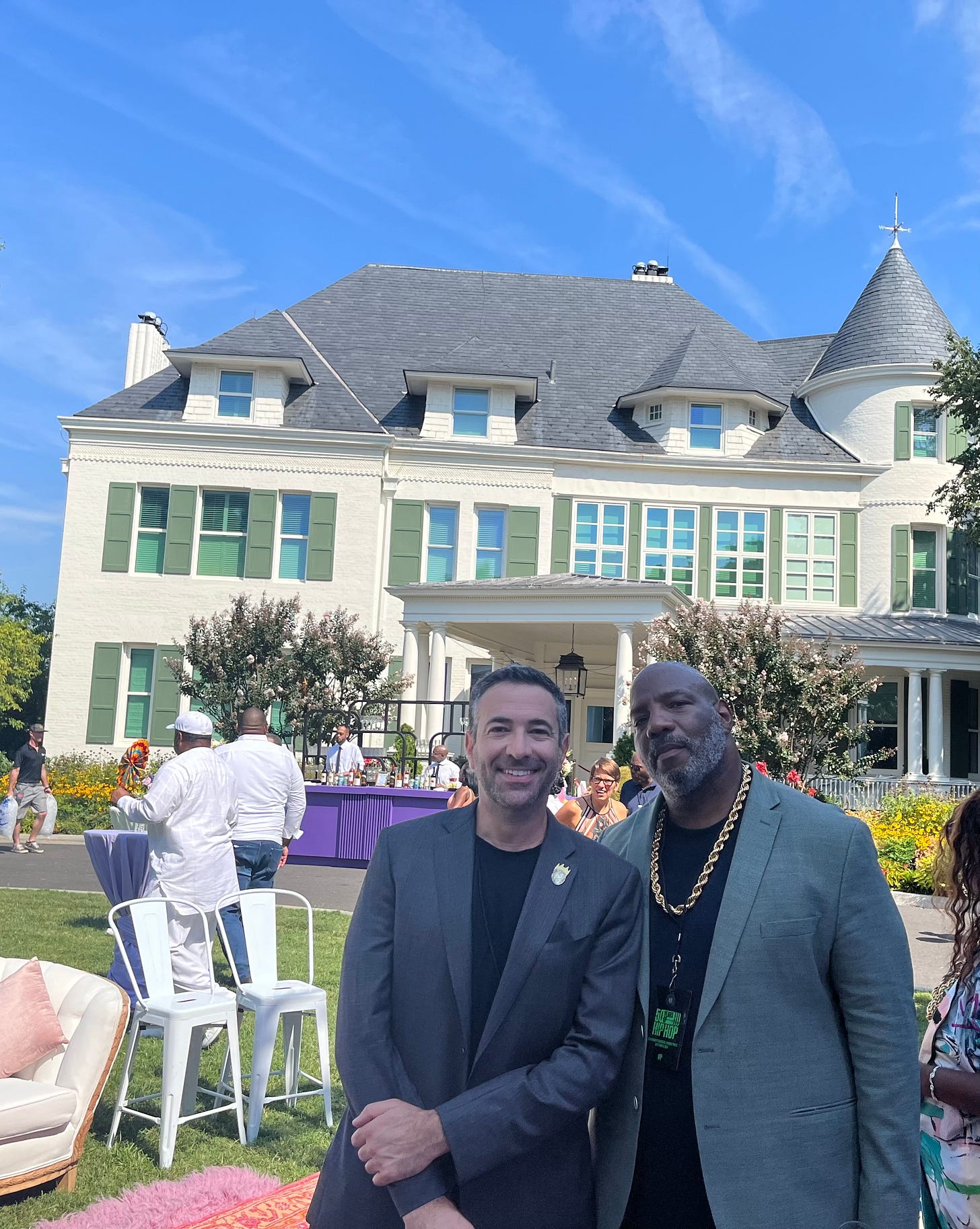Hi,
Here’s a new edition of my newsletter for you, a dispatch from a celebration at the Vice President’s house. Thanks for your interest and supporting my work!
Hip Hop is middle-aged
If you’re reading my newsletter, you probably know I like hip hop. But I am not alone on that. Today it’s the most popular genre in America, with rock in second place. (Rap is first with 26% of all “U.S. recorded-music consumption,” followed by Rock and Roll at 20%).
Rap has gotten many tributes this year, marking its official 50th anniversary. (Dated to a New York party that started it all.) There have been Grammy specials, concerts, exhibits, panels — plus some predictable corporate branding exercises. It hits a different level, though, when the leadership of the country gets involved.
That’s what just happened when the Biden administration held an official United States celebration marking the 50th, hosted by V.P. Harris, at her official residence.
At the unusual event, V.P. Harris spoke about this music, culture and its roots:
Hip-hop is the ultimate American art form, born at a back-to-school party in the Bronx… it now shapes nearly every aspect of America’s popular culture… combin[ing] rhythms from the continent of Africa, from the Caribbean, from Latin America, with the sounds of soul and gospel and R&B and funk, to create something entirely new.
Hip-hop is also an ethos of strength and self-determination — of ambition and aspiration, of pride, power, and purpose.
It was striking, and somewhat surreal, to hear a U.S. Vice President and former prosecutor tout and honor the genre like that. She shared some of her personal favorites — Sugarhill Gang and Too $hort (who was there) — and then cited the “raw” truths that rappers expressed, often opposed or attacked by mainstream society and political leaders.
Harris also posed a question for the assembled rap fans:
Why did we all love our hip-hop so much?
Well, one reason is it speaks truth — raw, unfiltered, without apology.
Like all art forms, especially what comes from the streets, it is not without criticism or controversy…. It has always channeled the voices of the people. It tells the stories that don’t make the news. But as the great Chuck D once said,
‘Rap is Black America’s [news channel]’.
By telling the truth, hip-hop calls us to action.
Harris spoke from a professional, concert style stage assembled on the lawn for the occasion. Then a parade of DJs and artists did short sets, which felt historic, with Lil Wayne as the finale.
The crowd was full of artists and people involved in hip hop culture, as well as some journalists and political figures. I got an invite and was psyched to attend.
“A hip-hop household!”
The second gentleman, Doug Emhoff, also spoke, telling the crowd, “this is a hip-hop household!”
This entire posture is quite new, with first Obama, and now Harris, offering the genre an embrace at this level.
Previously, rap was not only often dismissed, but politicians would campaign against it as a symbol of “urban blight,” or to make racialized points.
Republicans George Bush and Bob Dole famously courted public fights with rappers. Democrat Bill Clinton triangulated with an attack on a female rap artist, Sistah Souljah, comparing her lyrics to David Duke and the KKK at an event Jesse Jackson hosted. Most voters did not know her — and probably still don’t — analysts widely viewed it as Clinton creating a dispute to show he would “stand up” to elements associated with The Left, or a caricature of them, with racial undertones to all of it.
No Justice, No Meetings
When hip hop did intersect directly with the White House, it was usually a clash.
There was a scandal/non-troversy when the George H.W. Bush White House sent an invite to NWA’s Eazy-E for a fundraiser in 1991. He decided to go to make a point, and it became a media spectacle about a former “drug dealer” at the White House.
That incident made its way back into the music, when another artist seemed to criticize Eazy-E for making the trip, rapping, “I’d never have dinner with the President” (former bandmate turned frenemy, Ice Cube).
Some of that tension — at least with Republican Presidents — endures.
In 2018, then-President Trump tweeted a (relatively mild) rebuttal to public criticism from Jay-Z:
Jay’s response only came later in a song. And it sounded like a coda to Ice Cube’s point, adding an implied flex (“brag”) that even as an Obama supporter, Jay has so much influence he can spark Trump’s tweets:
“I got your President tweetin’
I won't even meet with him”
As the saying goes… snap.
The Next 50
What happens now that hip hop is more accepted and celebrated?
There’s a long history of the “counterculture” becoming the culture and rebels becoming part of the establishment. It’s a process that can dilute or commodify what made an artform special in the first place. That certainly happened to part of the original folk and rock scene, which is a topic (or newsletter) for another day. But here’s a difference for rap: Success and respect was always coveted and celebrated from the start.
Many leaders in this culture fought their way out from oppressive conditions, and always touted aspirational success. Getting money and power was an explicit goal — not some benefit that landed with an angsty debate about “selling out.” The rap group “The Lox” summed it up with their hit, “Money, Power, Respect (what you need in life).” Hip hop has now achieved that, and more.
P.S. Do you have a favorite artist or memory from hip hop’s 50 years?
Or a favorite artist who has been sampled or touted within hip hop, like George Clinton or Gil Scott Heron? Tell me in the comments and I’ll respond to some…










Ari Melber has done a great thing by incorporating Rap into his show. I’m 77 and didn’t like or dislike it. Part of my problem is that I could never hear the words, especially with the fast pace. I’m so uncool that I didn’t know a lot of the terms. I respect it now and I am glad that it is in our culture.
Ari, another great educational piece. I was talking to my sister when you dropped this newsletter. I remarked to her, “Ari just dropped a newsletter, it’s about “Hip Hop.” Don’t think, I’ll have anything to say on that.” We proceeded to declare the Sugarhill Gang, as our favorite, with Rapper’s Delight! Ironically, you mentioned them first-because they were! There have been many rap songs over the decades, but none matches that one. Finally, I recall several of your historical, controversial hip hop events, especially that of Sister Souljah. It was unfortunate, and so unnecessary!